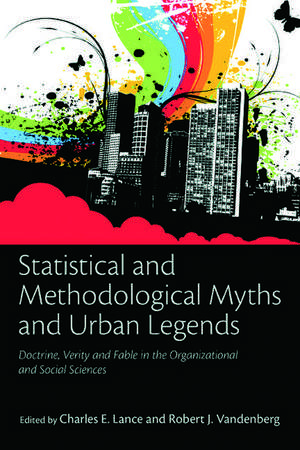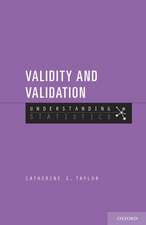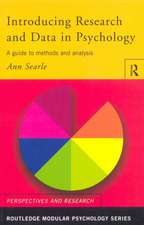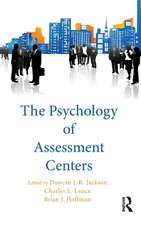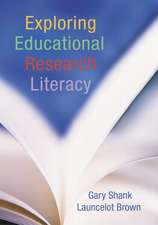Statistical and Methodological Myths and Urban Legends: Doctrine, Verity and Fable in Organizational and Social Sciences
Editat de Charles E. Lance, Robert J Vandenbergen Limba Engleză Paperback – 3 oct 2008
Historically, there is a kernel of truth to most of these legends, but in many cases that truth has been long forgotten, ignored or embellished beyond recognition. This book examines several such legends. Each chapter is organized to address: (a) what the legend is that "we (almost) all know to be true"; (b) what the "kernel of truth" is to each legend; (c) what the myths are that have developed around this kernel of truth; and (d) what the state of the practice should be. This book meets an important need for the accumulation and integration of these methodological and statistical practices.
| Toate formatele și edițiile | Preț | Express |
|---|---|---|
| Paperback (1) | 473.55 lei 6-8 săpt. | |
| Taylor & Francis – 3 oct 2008 | 473.55 lei 6-8 săpt. | |
| Hardback (1) | 1017.91 lei 6-8 săpt. | |
| Taylor & Francis – 3 oct 2008 | 1017.91 lei 6-8 săpt. |
Preț: 473.55 lei
Preț vechi: 557.12 lei
-15% Nou
Puncte Express: 710
Preț estimativ în valută:
90.62€ • 94.04$ • 75.75£
90.62€ • 94.04$ • 75.75£
Carte tipărită la comandă
Livrare economică 15-29 martie
Preluare comenzi: 021 569.72.76
Specificații
ISBN-13: 9780805862386
ISBN-10: 0805862382
Pagini: 432
Ilustrații: 21 black & white illustrations, 21 black & white tables
Dimensiuni: 152 x 229 x 25 mm
Greutate: 0.8 kg
Ediția:New.
Editura: Taylor & Francis
Colecția Routledge
Locul publicării:Oxford, United Kingdom
ISBN-10: 0805862382
Pagini: 432
Ilustrații: 21 black & white illustrations, 21 black & white tables
Dimensiuni: 152 x 229 x 25 mm
Greutate: 0.8 kg
Ediția:New.
Editura: Taylor & Francis
Colecția Routledge
Locul publicării:Oxford, United Kingdom
Cuprins
Part 1. Statistical Issues. Daniel A. Newman, Missing Data Techniques and Low Response Rates: The Role of Systematic Nonresponse Parameters. Michael J. Zickar, Alison A. Broadfoot, The Partial Revival of a Dead Horse? Comparing Classical Test Theory and Item Response Theory. Deborah L. Bandalos, Meggen R. Boehm, Four Common Misconceptions in Exploratory Factor Analysis. Adam W. Meade, Tara S. Behrend, Charles E. Lance, Dr. StrangeLOVE, or: How I Learned to Stop Worrying and Love Omitted Variables. James M. LeBreton, Jane Wu, Mark N. Bing, The Truth(s) on Testing for Mediation in the Social and Organizational Sciences. Jeffrey R. Edwards, Seven Deadly Myths of Testing Moderation in Organizational Research. Robert J. Vandenberg, Darrin M. Grelle, Alternative Model Specifications in Structural Equation Modeling: Facts, Fictions, and Truth. Ronald S. Landis, Bryan D. Edwards, Jose M. Cortina, On the Practice of Allowing Correlated Residuals Among Indicators in Structural Equation Models. Part 2. Methodological Issues. Lillian T. Eby, Carrie S. Hurst, Marcus M. Butts, Qualitative Research: The Red-Headed Stepchild in Organizational and Social Science Research? Scott Highhouse, Jennifer Z. Gillespie, Do Samples Really Matter That Much? Herman Aguinis, Erika E. Harden, Sample Size Rules of Thumb: Evaluating Three Common Practices. Jose M. Cortina, Ronald S. Landis, When Small Effect Sizes Tell a Big Story, and When Large Effect Sizes Don’t. David Chan, Why Ask Me? Are Self-report Data Really that Bad? Charles E. Lance, Lisa E. Baranik, Abby R. Lau, Elizabeth A. Scharlau, If It Ain’t Trait It Must Be Method: (Mis)application of the Multitrait Multimethod Design in Organizational Research. Marcus M. Butts, Thomas W. H. Ng, Chopped Liver? OK. Chopped Data? Not OK .
Recenzii
"It is an easy-to carry size and has clear print and particularly important, clear writing. The text includes many good charts and graphics that could come in handy as examples to be used in classes, especially high-level graduate classes in statistics or research methods. … Most doctoral students should have a copy of Lance and Vandenberg before they set words to paper in their dissertation proposals … The information in the many chapters can be very important in considering results and especially in considering limitations. It can serve as a rich source of primary articles and coherent discussion of many important topics." - Malcolm James Ree, Professor of Leadership, Our Lady of the Lake University, Texas, in Personnel Psychology
"Owning a copy of this book is essential for any researcher interested in issues regarding statistics and methods. It is beneficial as well for instructors." – Stephen A. Truhon, PsycCritiques
“The chapters in this book address topics with which every researcher has grappled with such as missing data, tests of moderating and mediating effects, dependence on self report data, and the importance of the sample of respondents available. With the increased interest and use of qualitative research, this volume should also be of wide interest. The book’s chapters promise to be standard citations in research papers for many years to come. Students are likely to find this book invaluable as they begin research careers. More experienced researchers will likely relate to these chapters as well, since they will have experienced the frustration associated with many of these problems firsthand." -Neal Schmitt,Chair, Michigan State University
"Misconceptions about methods are all too common in the organizational and social sciences and they impede research progress. Until now, researchers lacked a comprehensive guidebook that separates fact from fiction regarding appropriate methodological choices. Drawing on a world class team of authors, Lance and Vandenberg close the gap between 'what we know' and 'what we need to know' about missing data, factor analysis, moderation, mediation, structural equation modeling, sampling and many other essential methodological issues." -Dave Ketchen, Lowder Eminent Scholas and Professor of Management, Auburn University
"For every management researcher, this is a GREAT book. The chapters improve one's technical skills but also explain the many, many details that one always wanted to know. I recommend this book for all researchers and graduate and doctoral students. It's as close to a 'must have' as there can be." -Tom Lee, Michael G. Foster School of Business, University of Washington
"Owning a copy of this book is essential for any researcher interested in issues regarding statistics and methods. It is beneficial as well for instructors." – Stephen A. Truhon, PsycCritiques
“The chapters in this book address topics with which every researcher has grappled with such as missing data, tests of moderating and mediating effects, dependence on self report data, and the importance of the sample of respondents available. With the increased interest and use of qualitative research, this volume should also be of wide interest. The book’s chapters promise to be standard citations in research papers for many years to come. Students are likely to find this book invaluable as they begin research careers. More experienced researchers will likely relate to these chapters as well, since they will have experienced the frustration associated with many of these problems firsthand." -Neal Schmitt,Chair, Michigan State University
"Misconceptions about methods are all too common in the organizational and social sciences and they impede research progress. Until now, researchers lacked a comprehensive guidebook that separates fact from fiction regarding appropriate methodological choices. Drawing on a world class team of authors, Lance and Vandenberg close the gap between 'what we know' and 'what we need to know' about missing data, factor analysis, moderation, mediation, structural equation modeling, sampling and many other essential methodological issues." -Dave Ketchen, Lowder Eminent Scholas and Professor of Management, Auburn University
"For every management researcher, this is a GREAT book. The chapters improve one's technical skills but also explain the many, many details that one always wanted to know. I recommend this book for all researchers and graduate and doctoral students. It's as close to a 'must have' as there can be." -Tom Lee, Michael G. Foster School of Business, University of Washington
